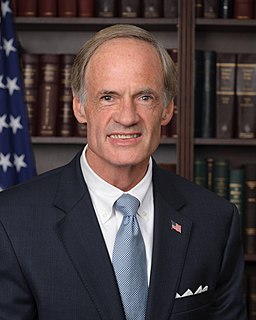A Quote by Tom Carper
In my home state of Delaware, we've done our homework and worked hard and, as a result, we've made great strides in cleaning up our own air pollution. Unfortunately, a number of the upwind states to the west of us have not made the same commitment to reducing harmful pollution by investing in cleaner air.
Related Quotes
My guess is that while the elites would like cleaner air, they are not willing to give up the convenience of being able to use their cars at will to get it, perhaps because they believe (I suspect incorrectly) that they can protect themselves from the consequences of vehicular pollution by investing in air-conditioners and air purifiers.
We've sued out-of-state power plants that are polluting our air and led a coalition of attorneys general from Connecticut, Delaware, Maryland, and Massachusetts against efforts in the U.S. House of Representatives to remove critical environmental regulations that protect New York communities from toxic pollution.
Today, about 40 percent of America's carbon pollution comes from our power plants. There are no federal limits to the amount those plants can pump into the air. None. We limit the amount of toxic chemicals like mercury, and sulfur, and arsenic in our air and water, but power plants can dump as much carbon pollution into our atmosphere as they want. It's not smart, it's not right, it's not safe, and I determined it needs to stop.
The preservation of parks, wilderness, and wildlife has also aided liberty by keeping alive the 19th century sense of adventure and awe with which our forefathers greeted the American West. Many laws protecting environmental quality have promoted liberty by securing property against the destructive trespass of pollution. In our own time, the nearly universal appreciation of these preserved landscapes, restored waters, and cleaner air through outdoor recreation is a modern expression of our freedom and leisure to enjoy the wonderful life that generations past have built for us.

































